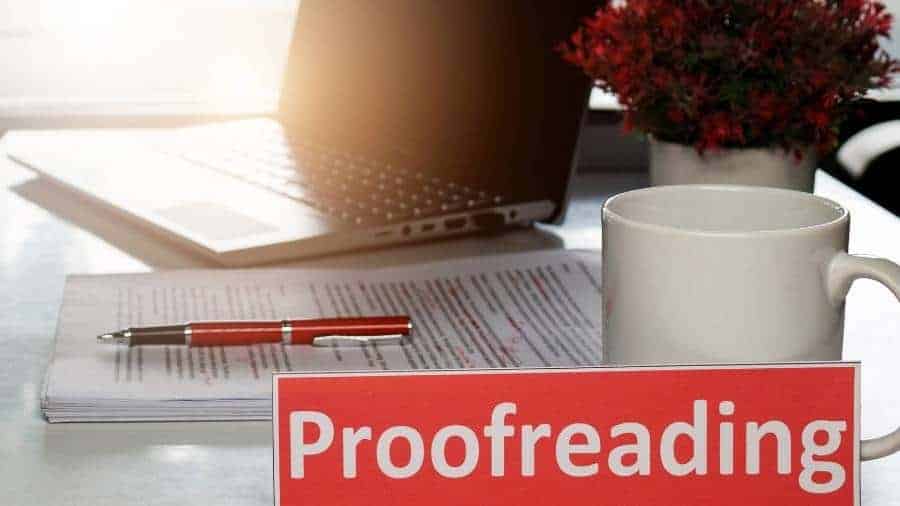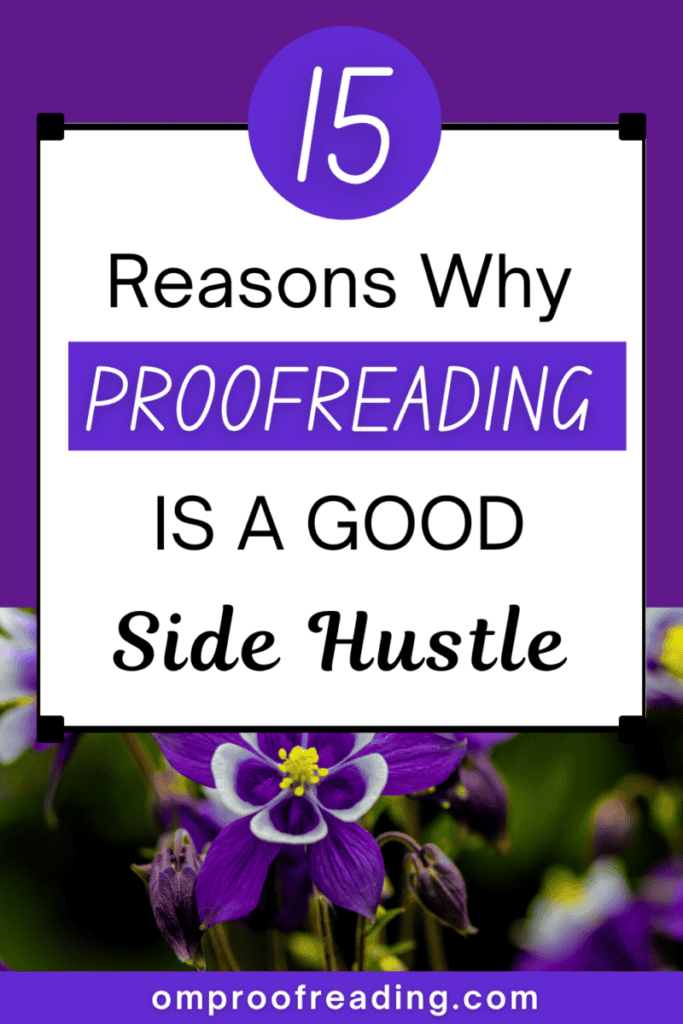This article may contain affiliate links. Please see our affiliate disclaimer in the footer menu for more information. Thank you for your support!

As a proofreader, I can tell you why proofreading is a sensible side gig.
Proofreading makes for a good side hustle due to its low startup costs, flexibility, and appeal to those who enjoy reading, continuous learning, and helping others.
Let’s briefly examine what proofreading entails and who would make a good proofreader. Then we’ll discover the advantages of this kind of gig and learn why you need training for this work.
Note: Proofreading is not your best bet if you need money right now. Getting the proper training to become a proofreader takes time, but it’s worthwhile!
What Is Proofreading?
Proofreading is the final step in the editorial process. A proofreader is the last person to work on a document before others read it. Their job is to find and fix errors in five primary areas:
- grammar
- capitalization
- punctuation
- spelling
- formatting
They also ensure proper word usage and check for omitted or repeated words. Finally, they make sure a text follows the appropriate style guide (e.g., The Chicago Manual of Style, The Associated Press Stylebook).
Would You Make a Good Proofreader?
If you’re a detail-oriented person who loves to read and tends to spot mistakes in written content, proofreading would be a good fit for you!
To help you determine if this side gig aligns with your skills and interests, I wrote an article about 13 signs you’d be a great proofreader.
Now let’s delve into the reasons why being an error detective is a solid side job!
Is Proofreading a Good Side Hustle?

I think proofreading is a good side gig. However, proofreading has downsides, too, so you’ll need to decide whether the pros outweigh the cons.
Let’s discover 15 reasons why proofreading is a solid side hustle.
1) The startup costs are reasonable.
Fortunately, becoming a proofreader is relatively inexpensive. Proofreading courses cost about $500–$700.
In addition to the training fee, you’ll need a stable internet connection, a laptop or desktop computer, and a recent version of Microsoft Word (not a free version). You’ll also want an online or a hard copy of a style guide and a good dictionary.
If you opt to have a website, a domain and hosting will cost roughly $100 per year.
Finally, investing in Grammarly Premium, PerfectIt, or both will make your job easier, but you can get by without these tools. Grammarly has a free version that isn’t as robust as the premium version, but it’s still quite helpful.
2) You can increase your rate as you get more experience.
I started babysitting when I was 12 and continued taking on gigs caring for kids well into my late 20s. I adore children, so babysitting was an ideal job for me.
But how many times did I increase my fees over all those years? I could probably count all the times on two or three fingers, lol!
Proofreading will allow you to up your fees more often as you get additional experience, training, and client testimonials.
3) Proofreading combines well with other side hustles.
I don’t know if you’re an animal lover, but I sure am!
Since you can proofread from any spot with a reliable Internet connection, you can take on that gig to care for your neighbor’s pets while you have proofreading assignments lined up!
Walking with an adoring dog or playing with a cute cat is a wonderful way to take a break from proofreading a document.
4) Proofreading is pandemic proof.
Since proofreading doesn’t require being near other people, you can do it during a pandemic. But that babysitting gig? As we know, it will come to a screeching halt.
People still hire proofreaders during pandemics. Unlike some other jobs that all but cease to exist during quarantine, proofreading jobs remain relatively unaffected.
5) You can take your proofreading side gig across borders.
Of course, a proofreading side hustle can be done from home.
But it can also be your travel companion wherever you go!
Provided you can access the Internet, you’ll be able to work.
So even if you travel from the Eastern Hemisphere to the Western Hemisphere, or vice versa, your proofreading gig will happily accompany you!
6) You can start a proofreading side hustle in retirement.
You can begin a proofreading side job after you retire. Proofreading is age friendly.
People who are retired but still want to work part-time and keep their minds active may enjoy this gig.
Proofreading can also fit the bill for those who miss making a positive contribution—helping others polish their prose is rewarding.
7) Proofreading leads to a broader knowledge base.

Being a proofreader will expand your breadth and depth of knowledge and enrich your vocabulary.
If you love to learn, you’ll enjoy this perk of being on error patrol!
8) Proofreading skills boost your performance in other jobs.
You may be shocked to learn that proofreading involves a lot of reading. I know. I didn’t realize that either! 😉
As we know, reading a lot helps you become a better writer. Countless jobs require good written communication skills. And what do proofreading skills help you with? You guessed it! They help you become a more effective communicator in writing.
Before becoming a proofreader, I was a teacher.
The proofreading skills I now possess would have undoubtedly helped me communicate more effectively at school since I often sent written notes home to the children’s parents.
I was also responsible for writing a monthly newsletter, crafting comments on report cards, and composing letters of recommendation for my students.
Proofreading skills are useful in any career that involves a lot of writing.
I penned a post about jobs where proofreading skills come in handy.
9) Proper proofreading proficiency will help you land a job.
When applying for a job, just one grammatical or spelling error in your résumé or cover letter could cost you that position you’ve been vying for.
I was a meticulous person before becoming a proofreader. However, now that my knack for finding fumbles is even more refined, I can polish my writing like never before.
10) Proofreading can open doors to other side hustles.

After becoming a proofreader and getting some experience under my belt, I decided to learn how to copyedit so I could work with a broader range of clients and make a bit more money.
I also found myself writing a children’s book. Me? A writer? Really? My Aunt Lindsay, my namesake, has published four books, and my sister has written an epic children’s story that she’s still fine-tuning. My grandfather was also a writer.
But I never could have imagined that I would be inspired and motivated to write a children’s story.
And believe it or not, the book I’m writing is a book of poetry. I typically don’t read poetry, so you can imagine how surprised I was to find myself writing it.
I had heard other proofreaders talk about discovering other interests and talents after learning how to proofread.
I think this may happen for a couple of reasons.
First, learning how to proofread gives you greater confidence in your language abilities.
Second, as you spend additional time reading and learning, you become increasingly aware of and open to new ideas and opportunities.
Other related side hustles (besides copyediting) that proofreaders may wish to pursue include editing, beta reading, content writing, and copywriting.
11) A proofreading side hustle adds to your financial security.
Of course, a proofreading side job enhances your financial security by providing a second stream of income.
And what would you do if you ever got laid off or fired from your day job? Your proofreading side hustle could help you make ends meet until you find another job.
Some people even decide to proofread full-time once they’ve gained sufficient experience to charge rates high enough to support their lifestyle.
12) You don’t need a college degree for this side hustle.
A college degree will undoubtedly give you a leg up in proofreading since college requires a lot of reading and writing. A degree will also likely make it easier to attract clients.

However, you don’t need a degree to become a proofreader. While some proofreading jobs require a degree, many do not!
If you enjoy reading and have a knack for finding errors, you can succeed in this side hustle.
You just need to be willing to develop exceptional language skills and put forth the effort required to complete the training. With time, you can become a proofreader extraordinaire! 😊
13) Proofreading is a flexible side job.
If you work as a freelancer (most proofreaders do), you can work early in the morning, late at night, on the weekends, or whenever works best for you.
As long as you can meet your client’s deadlines, you can set your own hours.
If you have a lot of other commitments, the flexibility of proofreading is particularly appealing.
14) It lets you continue to enjoy a hobby you love: reading!
If you’re an avid reader, you’ll still get to spend time reading; you’ll just do it with a much more critical eye.
However, if you don’t enjoy reading, working on error patrol probably isn’t for you!
15) You can do it rain or shine.
Some side hustles like mowing lawns, painting houses, and landscaping may get rained (or snowed) out on occasion. But not proofreading! I hear proofreading is typically done indoors. 😉
Why You Need Training to Start a Proofreading Side Hustle
Proofreading doesn’t just involve finding and correcting grammar and spelling errors in a text.
A proofreading course will teach you how to differentiate between proofreading and various types of editing so that you don’t overstep your responsibilities.
You’ll also become familiar with style guides, learn to maintain the author’s voice, and get plenty of practice proofreading real-life sample documents.
Finally, if you want to start your own business, you’ll need to learn how to build a website and market yourself.
If you’re interested in a proofreading course that also teaches you relevant business and marketing skills, I highly recommend Proofread Anywhere’s General Proofreading: Theory and Practice™ course.
It’s the class I took, and I loved it!
Another excellent option for training is the Knowadays Becoming a Proofreader class. The advantage of this class is that it comes with a work guarantee for those who qualify.
Om Proofreading has an article that compares four excellent courses for receiving training as a proofreader if you’d like to compare all my program recommendations side by side.
Becoming a proofreader requires hard work and perseverance, but it can lead to a rewarding side hustle!
I authored an article that discusses how much freelance proofreaders get paid if you’re curious about this.
Best wishes to you!
“If you don’t go after what you want, you’ll never have it. If you don’t ask, the answer is always no. If you don’t step forward, you’re always in the same place.”
– Nora Roberts

